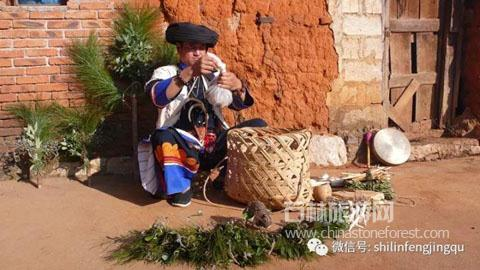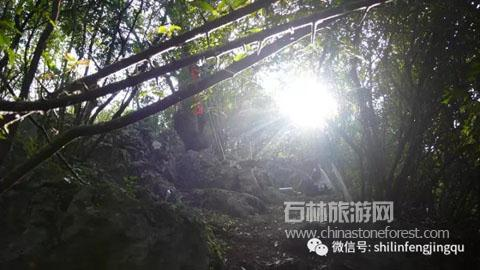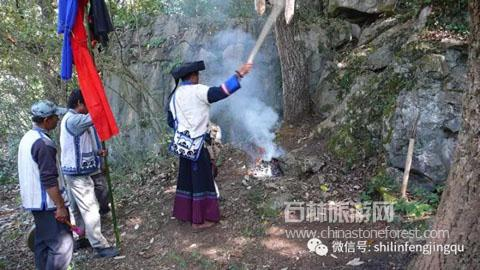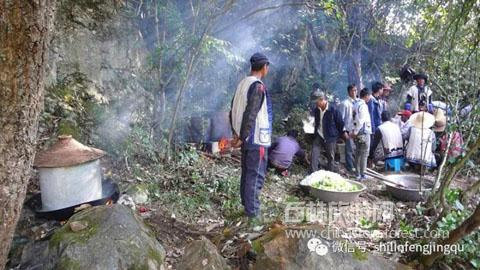
Sacrifice
(photographed by Suo Wenliang)
Mizhi Festival is another solemn and
interesting traditional festival of Sani people in Shilin. Generally it lasts for 7
days from the first mouse day to horse day of the lunar winter month, and
ritual activities will be held by village or stockaded village.

Bimo (photographed by Suo Wenliang)
According to legend, the ancestors of Sani people
lived in dense forests on the mountains in ancient times, they lived on first
hunting and later herding. One day there was suddenly a big hail all the goats
were killed by thunders; however, a smart shepherd named Mizhisima sent goats
into the woods, avoiding disasters and protecting the goats. It is said that
all the goats now are developed from Mizhisima's place. In order to commemorate
her, Sani people celebrate Mizhi Festival every year. Activities at that time
are taken per village or stockaded village, each family will send a man who takes a
goat to Mizhi forest to kill it. After the mutton is cooked, Bimo will chant
the scriptures and worship Mizhisima. Then people divide mutton even and have a
meal together in the woods, but they should not finish the mutton; instead,
they save some to take home after dark to share with family members. When
entering the village, a person should lead the group and shout "Ha Gou! Ha
Gou!” to warn those people who do not obey the village rules and violate the
morality.

Mizhi Festival (photographed by Suo Wenliang)

Taking
fire (photographed by Suo Wenliang)
Mizhi forest is a sacred place for Sani people that
cannot be offended. It is not allowed to cut trees or branches, or hunt in it.
Dead people are never allowed to be buried inside, and women are not allowed to
enter this forest. Each grass and tree in Mizhi forest has majestic power, and
if offended, there will be severely punished by
Mizhisima. For years, people have been protecting Mizhi forest with this divine
concept for generations, making the ancient trees inside green and luxuriant.

Sani people's memorial ceremony for Mizhi reflects their traditional
virtue of protecting forest, having far-reaching practical significance. This
legend provides a basis for the study of primitive religious issues. This
legend reflects the traditional habits and virtues of Sani people to protect
forest since ancient times. Memorial activities for Mizhi have invisible value
and significance of publicity for protecting forest and improving ecological
environment. (Data from online)

Mutton soup pot (photographed by Suo Wenliang)
![]() No. 53012602000141, Anne, Yunnan Public Network
No. 53012602000141, Anne, Yunnan Public Network





